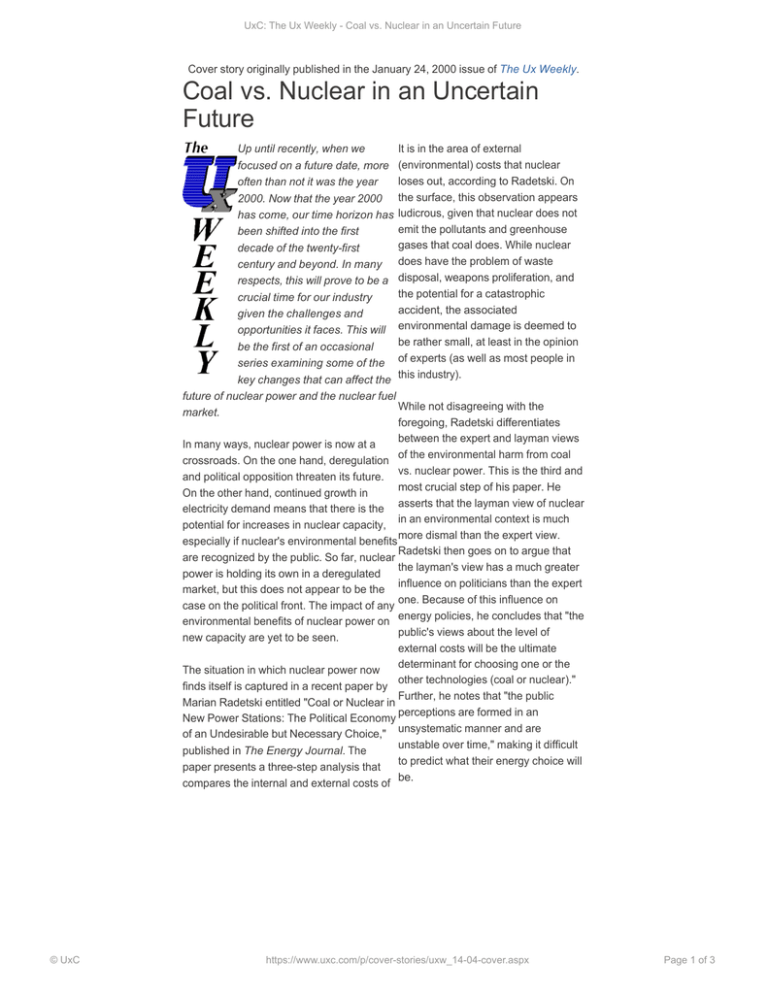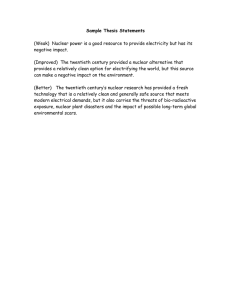
UxC: The Ux Weekly - Coal vs. Nuclear in an Uncertain Future
Cover story originally published in the January 24, 2000 issue of The Ux Weekly.
Coal vs. Nuclear in an Uncertain
Future
Up until recently, when we
It is in the area of external
focused on a future date, more (environmental) costs that nuclear
loses out, according to Radetski. On
often than not it was the year
2000. Now that the year 2000 the surface, this observation appears
has come, our time horizon has ludicrous, given that nuclear does not
emit the pollutants and greenhouse
been shifted into the first
gases that coal does. While nuclear
decade of the twenty-first
century and beyond. In many does have the problem of waste
respects, this will prove to be a disposal, weapons proliferation, and
the potential for a catastrophic
crucial time for our industry
accident, the associated
given the challenges and
opportunities it faces. This will environmental damage is deemed to
be rather small, at least in the opinion
be the first of an occasional
series examining some of the of experts (as well as most people in
key changes that can affect the this industry).
future of nuclear power and the nuclear fuel
While not disagreeing with the
market.
foregoing, Radetski differentiates
between the expert and layman views
In many ways, nuclear power is now at a
of the environmental harm from coal
crossroads. On the one hand, deregulation
vs. nuclear power. This is the third and
and political opposition threaten its future.
most crucial step of his paper. He
On the other hand, continued growth in
asserts that the layman view of nuclear
electricity demand means that there is the
potential for increases in nuclear capacity, in an environmental context is much
especially if nuclear's environmental benefits more dismal than the expert view.
Radetski then goes on to argue that
are recognized by the public. So far, nuclear
the layman's view has a much greater
power is holding its own in a deregulated
influence on politicians than the expert
market, but this does not appear to be the
one. Because of this influence on
case on the political front. The impact of any
environmental benefits of nuclear power on energy policies, he concludes that "the
public's views about the level of
new capacity are yet to be seen.
external costs will be the ultimate
determinant for choosing one or the
The situation in which nuclear power now
other technologies (coal or nuclear)."
finds itself is captured in a recent paper by
Further, he notes that "the public
Marian Radetski entitled "Coal or Nuclear in
perceptions are formed in an
New Power Stations: The Political Economy
of an Undesirable but Necessary Choice," unsystematic manner and are
unstable over time," making it difficult
published in The Energy Journal. The
to predict what their energy choice will
paper presents a three-step analysis that
be.
compares the internal and external costs of
© UxC
https://www.uxc.com/p/cover-stories/uxw_14-04-cover.aspx
Page 1 of 3
UxC: The Ux Weekly - Coal vs. Nuclear in an Uncertain Future
coal and nuclear power, and examines
Radetski thus attributes the decision
expert versus layman views on the
of some countries to abandon or
magnitude of the external costs. In the
prematurely shutter their nuclear
paper, internal costs are identified as those
power programs (Italy, Sweden, and
associated with the direct production of
Germany) to the discrepancy between
electricity--the type most people think of
the expert and lay views of external
when making cost comparisons, while
costs being much more extreme for
external costs are ancillary to the production
nuclear than for coal, with nuclear
process and typically relate to environmental
suffering as a consequence.
impacts associated with the energy choice.
If Radetski's analysis is correct, it has
Radetski starts out by noting that natural gas
profound implications for the future of
is the overwhelming choice for the
nuclear power. Changing the public
expansion of electricity generating capacity,
and hence political view about nuclear
with hydro power also favored. However,
power could tip the scales toward
these energy sources are not universally
nuclear in its competition with coal
available, meaning that other sources must
and could potentially result in a
also expand to meet future electricity
considerable expansion of nuclear
demand. He points out that this expansion
capacity. Of course, this is precisely
must come from either coal or nuclear
the activity with which organizations
power, which together currently account for
like the Nuclear Energy Institute and
over half of all electricity generation. To put
the Uranium Institute are involved. On
this into perspective, Radetski notes that in
the surface, Radetski's thesis should
1995 13,204 TWh of power was generated
be embraced by these organizations,
worldwide, and the International Energy
as it helps justify their existence.
Agency (IEA) projects that 20,852 TWh will
However, it also magnifies any failure
be produced in 2010, and increase of 7,648
to produce opinion changes that
TWh. Of this increase, the IEA projects that
effectively help nuclear power (or,
3,131 TWh will come from natural gas
more precisely, changes that can be
generation and 947 TWh from hydro power,
demonstrated to help nuclear's
leaving a balance of 3,570 TWh to come
prospects). Taking polls that shows
from coal, nuclear, oil, and renewable
that the public's opinion of nuclear
sources. Of this balance, the IEA projects
power is improving doesn't cut it
that 2,846 TWh will come from coal and only
unless it can be shown that this
236 TWh from nuclear power. Nuclear's
change is having an appreciable
contribution is less than 348 TWh that is
impact on energy policy.
projected to come from oil, which by any
measure is environmentally undesirable.
The challenge appears to be quite
difficult. Not only is the battle being
lost in certain European countries, but
the fact that nuclear is holding its own
in some countries while losing ground
in others indicates that the issue must
be tackled on a country-by-country
basis. One explanation for this
difference recounted by Radetski in
his paper is that nuclear has been
successful in countries where political
decisions reside with a small,
powerful group--France, Japan, and
Korea (the same can be said for the
former Soviet Union), suggesting that
© UxC
https://www.uxc.com/p/cover-stories/uxw_14-04-cover.aspx
Page 2 of 3
UxC: The Ux Weekly - Coal vs. Nuclear in an Uncertain Future
The low growth of nuclear power is not
surprising to most people in this industry,
and many would attribute it to nuclear being
at an economic disadvantage compared to
coal. However, Radetski points out that this
is not the case. On the basis of internal
costs, he notes that coal and nuclear are
roughly equivalent, although nuclear suffers
when a higher discount rate is used due to
its higher capital costs.
the "acceptance" of nuclear in these
countries is more a function of the
political system than public opinion at
large.
The foregoing suggests that any trend
away from more centralized
decisionmaking may be bad for
nuclear power. One argument against
this line of thinking relates to nuclear
power in the United States. On an
absolute basis, the U.S. still has by far
the largest nuclear program of any
country. While the program has not
been growing (in terms of new
reactors) in recent years, there is no
concerted political effort to dismantle
it. By and large, political
decisionmaking in the U.S. is
decentralized and quite open to public
opinion. More importantly, the
economy is market driven, more so
than any other country in the world. If
the U.S. represents the new
political/economic paradigm and
nuclear power can survive and even
flourish here, then perhaps there is
hope for other countries. Clearly, more
work needs to be done in the area of
understanding the forces that shape
nuclear power's destiny.
Copyright © Ux Consulting, All Rights Reserved.
© UxC
https://www.uxc.com/p/cover-stories/uxw_14-04-cover.aspx
Page 3 of 3




